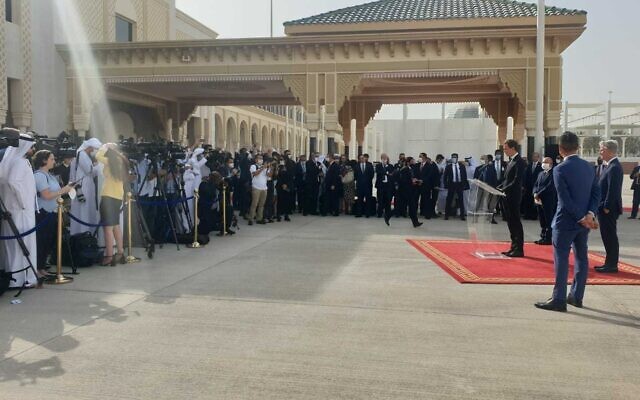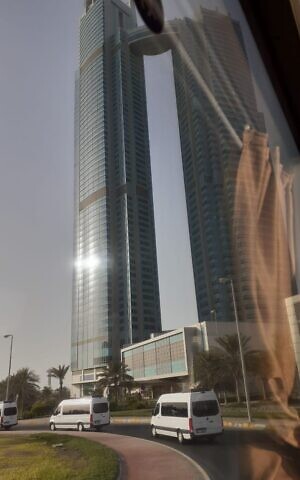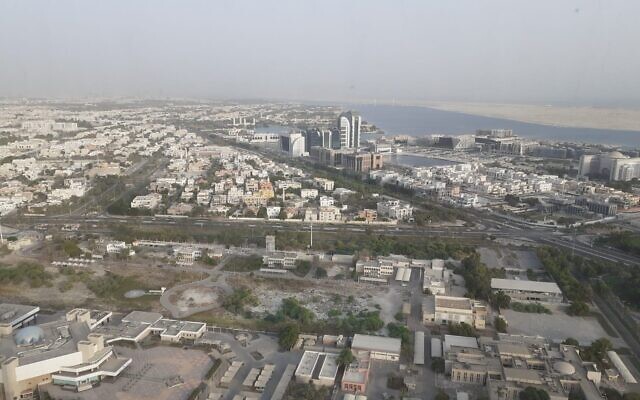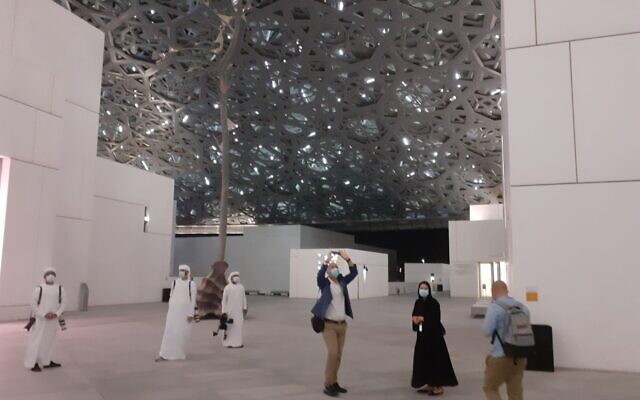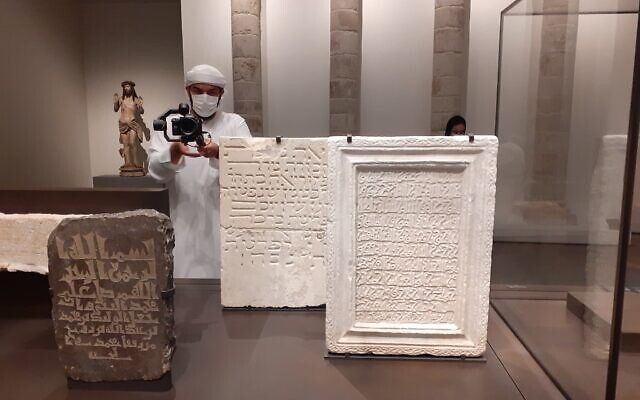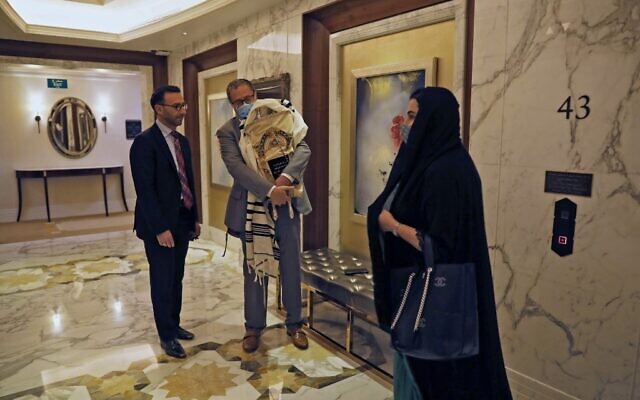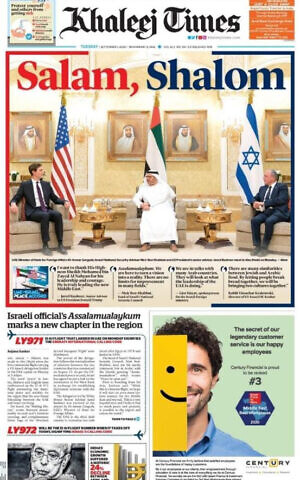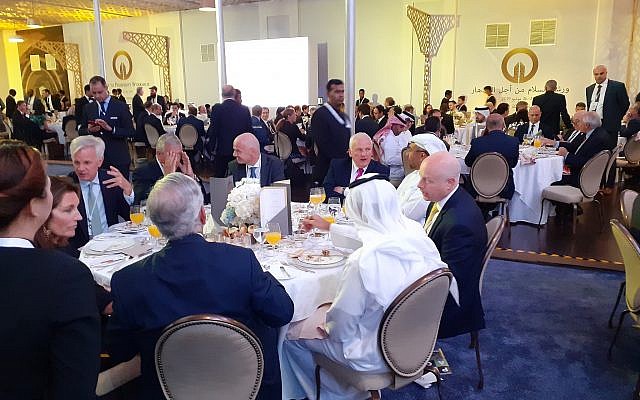
Following our historic nonstop flight from Tel Aviv to Abu Dhabi, the Emirati authorities are going out of their way to make their Israeli guests feel wanted.
ABU DHABI, United Arab Emirates — Israel and the United Arab Emirates were never at war, but the normalization of ties between these two countries, which is advancing at a dizzying pace, promises to become a very warm peace. At least that’s the impression the Israeli delegation to the Gulf country got on its historic first day here Monday.
As soon as we stepped out of the Boeing 737-900 onto the Abu Dhabi tarmac and into the 44°C afternoon heat, we Israelis visitors were all treated like honored guests.
There were Israeli flags waving alongside the American and the Emirate ones in the airport terminal.
On the journalists’ bus, bottles of water and orange juice and cookies made in Oman were waiting.
And our fast-moving motorcade — the bus for us reporters, some vans and limos for the genuine VIPS — was escorted to the hotel by local police cars, who honked brusquely whenever anyone else came too close to us on the road and might have slowed us down.
August 31, 2020 (Raphael Ahren / Times of Israel)
This is not the norm for visits of this Israeli level in most other parts of the world. It was not, after all, a state visit by Prime Minister Benjamin Netanyahu, or even a working visit by a foreign minister.
But we were making history — as the Israeli part of a US-Israeli delegation headed by US President Donald Trump’s senior advisor Jared Kushner and the US and Israeli national security advisers, joined by the directors-general of Israeli ministries and other Israeli officials seeking to lay the groundwork for thriving diplomatic relations.
And our hosts wanted to ensure that we felt wanted and welcome.
When I entered my room on the 37th floor of the city’s magnificent St. Regis hotel, I found some exquisite baked goods and several other gifts in a bag with the UAE’s official emblem on it.
It contained a locally made dark amber and cardamon-scented candle, a jar of raw organic samr honey, and a rabaah — a spike fiddle traditionally used by nomadic Bedouins — in a fine leather bag.
In the evening, the traveling press was invited to a quick tour of the Abu Dhabi Louvre, a sprawling branch of the Parisian museum.
Besides many stunning artworks and historical artifacts on loan from European museums,
it also features a gravestone with Hebrew inscriptions from medieval France, an 1831 Auguste de Forbin painting of Jerusalem and a model of the so-called Abrahamic House — a campus with a mosque, a church and a synagogue that is currently being built in the city.
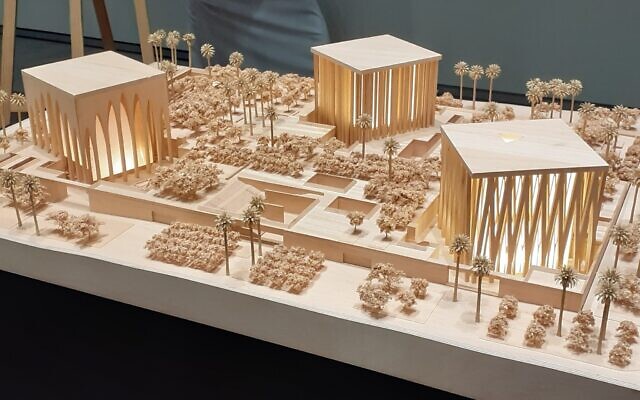
The message to us was clear: The UAE is modern, tolerant and open — you Israelis can feel comfortable about the budding peace between us.
After the quick museum tour, we were treated to a banquet dinner, with four off-record briefings from prominent Emirati officials who talked to us about Emirati culture, society and history. Besides the speakers, our hosts invited Emiratis from various walks of life to chat with us during dinner — and all of them hailed the normalization agreement with Israel, and looked forward to the ceremony formalizing ties, and deepening relations to follow. The Middle East has seen too much conflict, and it’s time for a paradigm change, they said.
“We could not be happier to have you all here,” said one of those who spoke to us, and it didn’t feel forced. “I’m literally looking at cousins,” noted another, arguing that Jews and Muslims, Israelis and Arabs, have more in common than divides them.
Memories of Manama
In the summer of 2019, I was invited to a similar gala dinner in Manama, which took place on the sidelines of the Peace to Prosperity workshop co-hosted by the US and Bahrain. The Bahrainis, too, treated our small group of Israeli reporters as most welcome guests.
Those of us who strictly observe Jewish dietary laws were offered grilled fish by our hosts, carefully wrapped in aluminum foil so it wouldn’t come into contact with the non-kosher delicacies served for the other delegates.
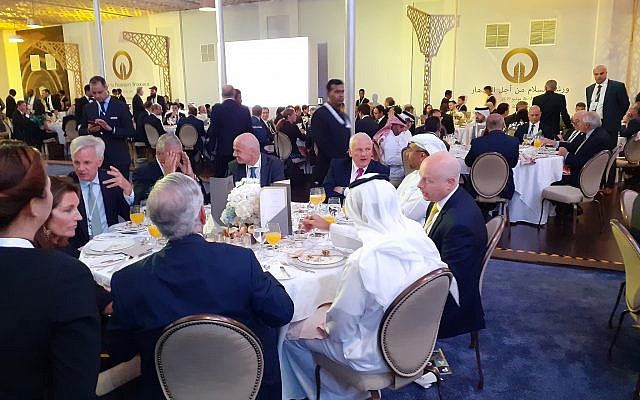
In Abu Dhabi, those keeping kosher were served a kosher-certified gourmet dinner.
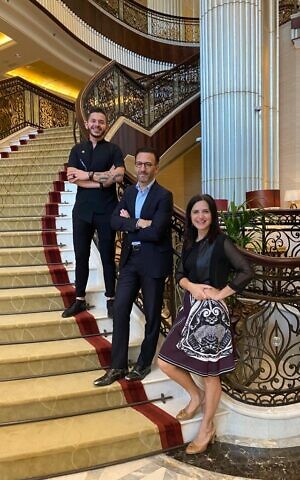
ahead of a dinner for Israeli journalists in Abu Dhabi,
August 31, 2020 (courtesy)
(For starters, there was beetroot salad, artichokes, mushroom tempura, zucchini balls with feta cheese, vegetarian spring rolls with sweet and spicy sauce. This was followed by salmon with lemon butter sauce, filled seabass fillet, sweet potato with fresh truffle and crispy microgreens and garlic baby vegetables. For dessert, there was “lava dark chocolate fondant and dehydrated wild berries.”)
The kosher food was prepared by Elli’s Kosher Kitchen, a Dubai-based catering business owned by Elli Kriel — the wife of Ross Kriel, the president of the UAE’s small Jewish community, who had actually brought a Torah scroll to Abu Dhabi for the occasion.
in Abu Dhabi on August 31, 2020. (NIR ELIAS / AFP)
Rabbi Yissachar Krakowski of OU Kosher, the world’s largest kosher certification agency, had flown from Israel to the UAE to facilitate all of the kosher food for the Israeli delegation, including this meal. (Krakowski has experience with kosher catering in the Gulf, having organized kosher meals for the Conference of Presidents of Major American Jewish Organizations when they visited the UAE and Saudi Arabia.)
Wrong
“OK, the bad news first: The State of Israel and the Kingdom of Bahrain are not about to establish diplomatic relations,” I wrote in June 2019, after that gala dinner in Manama. “Not this week, in the immediate aftermath of the US-led Peace to Prosperity economic workshop hosted here, and nor probably in the months, or even years, to come.”
A peace deal with the Palestinians, I asserted at the time, remains the ultimate glass ceiling that needs to be smashed before any Gulf state is ready to normalize ties with Israel.
Monday’s historic nonstop flight from Tel Aviv to Abu Dhabi, and the care and enthusiasm with which Emiratis welcomed us to their country, shows how wrong I was.
(Raphael Ahren – Times of Israel).
